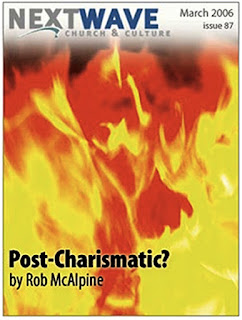Post-Charismatic: A Publishing Journey
The saga of Post-Charismatic is a whirlwind tour of the publishing world and the roller-coaster ups-and-downs associated with it.
There was a lot of discussion in this blog’s early days (circa 2004) about a growing exodus of disillusioned believers from Pentecostal and charismatic churches. Many had once viewed their churches as a valuable source of spiritual vitality — but no longer.
Encouraged/egged-on by several blogging friends, I decided to try my hand at unpacking the “why’s” behind the growing number of self-identified post-charismatics. I envisioned a bit of background reading and research, dialogue with some fellow Spirit-filled refugees, and then writing a blogging mini-series (five, maybe six posts).
I’d barely begun my research when I realized “a few blog posts” wouldn’t do the topic justice. Instead, what was tentatively billed as the Post-Charismatic Project would be published as a subsection of my blog — an extremely large subsection, as twenty months of research and writing took shape. I jokingly referred to it as “the mother of all research papers.”
Even before its release, several people suggested I look into getting the content published in book form. I did my best to shop the proposal around but received zero response. (Note: possibly because my query letters sucked.)
So I went ahead with my initial plan and designed a website-within-a-blog.
 |
| In hindsight, I have no idea what inspired this banner art. |
“You mean our senior acquisitions editor?” the polite British woman asked over the phone. “I’d take an email from him very seriously, if I were you.”
And then it hit me. I’ve been discovered. A legit company wants to publish the Project!
A whirlwind of contract signing and untangling governmental red tape between a Canadian writer and a British publishing house ensued. I quickly found myself knee-deep in the process of editors scouring through my manuscript, suggesting additions, deletions, areas where the material could be tightened up, and so on. It was a fun learning curve.
Eventually, I was treated to the odd sensation which accompanies the first glimpse of the proposed cover art. Initially, I wasn’t a huge fan of either design, to be honest (especially all the question marks), but that’s part of the publication swirl. You don’t have control over what the publisher decides. And they’re the experts, so you need to trust their instincts.
And then another unexpected twist ...
Post-Charismatic? was available in bookstores all over the UK, garnering press attention and positive reviews. Emails and hand-written letters from readers across the Pond started showing up in my digital and analog mailboxes, including one from a university professor who used the book in one of his classes.
But for reasons unknown, the release on this side of the Atlantic was delayed for over a year. My inbox was flooded with requests from American and Canadian readers who wanted copies, but there was nothing I could do. Their only option was to order a copy through Amazon UK.
As I later learned, an American publishing house had bought out the British company, and their rules for publication were different. Things became clearer when I phoned the American company directly.
“Do you have a radio or television presence, Robby? You don’t? Well, are you a known commodity on the conference speaking circuit? I see ... Are you a mega-church pastor? No?” Long pause. “I guess we’re done here.”
“The British publisher seems to believe in my writing.”
“They don’t know what they’re doing. We downsized them.”
In short, their sales department had decided that I didn’t qualify to be published. Since legally-binding documents had been signed, they were contractually obligated to the first print run. But that was as far as they would (grudgingly) go.
Zero promotion. Non-existent publicity. No buzz. Another year passed before Post-Charismatic? finally became available on Amazon USA.
For a writer, this was understandably frustrating and not a little deflating. The three-year print run came and went, and the muffled thud you may have heard was the apparent end of my writing career.
But after the print run ended, I continued to receive private inquiries about the book’s availability. Self-described fan-boy Luke Geraty, who would later invite me to join the writing team at Think Theology, planted the idea of creating an ebook version. And I realized I had another option: the wild frontier of self-publishing.
It took almost half a year of wrangling with the American company to obtain an official “author rights reversal” (despite this being clearly delineated in my contract). They also waived their “right of first refusal” for my next book, because their sales department considered me perpetually unpublishable.
The important piece is this: with an author rights reversal, I regained creative and legal control over my work.
Post-Charismatic 2.0 appeared in print and digital formats in 2013. The learning curve to create both print and ebook versions was steep, but having artistic control of my work was well worth it.
The fall of 2023 saw the release of a 10th Anniversary edition, simply entitled Post-Charismatic — updated with current research and critique on the New Apostolic Reformation (NAR) and Christian nationalism, and a fictional "Charismatics Anonymous" framing story to introduce and conclude the book.
I had no idea how this publishing journey would unfold when I began researching for “a few blog posts” back in 2004. It’s been a challenging, satisfying, and ultimately empowering education.
PS. Check out my recent interview with Luke Geraty at The Sacramental Charismatic.





